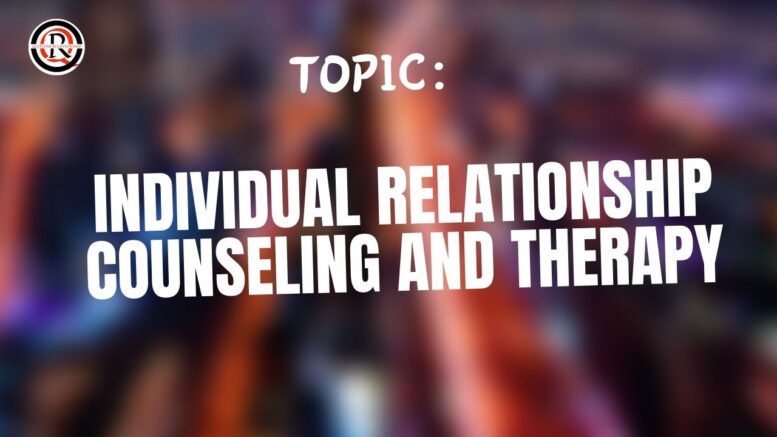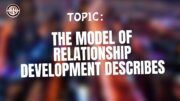If you are just starting out in a new relationship, there are some situations that will warrant you to seek out individual relationship counseling or therapy that will serve as a guide in your relationship to help us avoid some certain situations, well in this article we are going to vividly cover these one-on-one know-how of relationship counseling but first lets understand what individual counseling is…
What is individual counseling?
Individual counseling, also known as one-on-one therapy or personal therapy, is a form of psychological or mental health support provided to an individual by a trained professional counselor or therapist. It is a confidential and collaborative process that aims to help individuals explore their thoughts, feelings, and behaviors, and work towards personal growth, emotional well-being, and resolving any difficulties they may be experiencing.
During individual counseling sessions, the therapist creates a safe and non-judgmental space for the individual to discuss their concerns, challenges, or goals. The counselor actively listens, empathizes, and guides the individual through the therapeutic process. They may use various therapeutic techniques and interventions based on their training and the needs of the client.
The goals of individual counseling can vary depending on the individual’s specific needs and circumstances. Some common objectives include:
Gaining insight and self-awareness
- Exploring thoughts, emotions, and behaviors to develop a deeper understanding of oneself.
Problem-solving
- Addressing specific issues, challenges, or conflicts and developing effective strategies to cope with them.
Emotional regulation
- Learning skills to manage and cope with difficult emotions such as stress, anxiety, anger, or grief.
Enhancing self-esteem and self-confidence
- Building a positive self-image and developing a stronger sense of self-worth.
Developing coping mechanisms
- Acquiring healthy coping skills and techniques to deal with life stressors, relationship difficulties, or traumatic experiences.
Improving communication and interpersonal skills
- Enhancing the ability to express oneself, establish boundaries, and maintain healthy relationships.
Setting and achieving goals
- Identifying personal goals and working towards their accomplishment with guidance and support.
A number of difficulties, such as anxiety, depression, trauma, marital challenges, life changes, grief and loss, low self-esteem, and more, can benefit from individual counseling. The duration and frequency of sessions can vary depending on the individual’s needs and the therapeutic approach used.
It’s important to note that individual counseling is just one form of therapy, and there are other types of counseling and therapeutic interventions available, such as group therapy, couples therapy, family therapy, or specialized therapies for specific mental health conditions. The choice of therapy depends on the individual’s preferences and the nature of the concerns they wish to address.
Types of therapy for relationship issues
There are various types of therapy that can be effective in addressing relationship issues. The choice of therapy depends on the specific needs and preferences of the individuals involved. Here are some common types of therapy used for relationship issues:
1. Couples Therapy/Marriage Counseling
Couples therapy is specifically designed to address relationship issues and improve the dynamics between partners. It involves both partners attending therapy sessions together. Couples therapy focuses on improving communication, resolving conflicts, rebuilding trust, enhancing intimacy, and strengthening the overall relationship.
2. 3. Emotionally Focused Therapy (EFT)
EFT is a type of therapy that focuses on identifying and transforming negative emotional patterns within a relationship. It aims to help partners understand and express their underlying emotions and needs, promoting deeper emotional bonding and creating secure attachment.
3. Imago Relationship Therapy
Imago Relationship Therapy explores the childhood experiences and unconscious patterns that shape how individuals relate to their partners. It aims to create a conscious and intentional relationship by helping couples understand and heal their past wounds and develop new ways of relating to each other.
4. Gottman Method Couples Therapy
The Gottman Method is an evidence-based approach that focuses on strengthening relationships and enhancing relationship satisfaction. It involves assessment, skill-building, and interventions to improve communication, manage conflict, build friendship and intimacy, and develop shared goals.
5. Narrative Therapy
Narrative therapy examines the stories individuals tell themselves and each other about their relationship. It explores how these stories shape perceptions and interactions. By reframing and reconstructing narratives, couples can gain new perspectives and possibilities for positive change.
6. Solution-Focused Brief Therapy (SFBT)
SFBT focuses on identifying and amplifying the strengths and solutions within a relationship. It helps couples set clear goals, explore exceptions to their problems, and develop practical strategies to achieve their desired outcomes.
7. Integrative Therapy
Integrative therapy draws from multiple therapeutic approaches based on the needs of the couple. It combines elements from various modalities to tailor the treatment to the unique dynamics of the relationship and the individuals involved.
It’s worth noting that the involvement of both partners in therapy is typically recommended for addressing relationship issues. However, individual therapy can also be valuable for working on personal growth, addressing personal issues that impact the relationship, and developing skills that contribute to healthier interactions within the partnership.
The specific type of therapy chosen will depend on factors such as the nature of the issues, the goals of the individuals involved, the therapist’s expertise, and the therapeutic approach that resonates best with the couple.
What is therapy for individual with relationship issues?
Therapy for individuals with relationship issues is a form of counseling specifically designed to address and explore difficulties and challenges within interpersonal relationships. It focuses on helping individuals gain insight into their relationship patterns, develop effective communication skills, and improve the quality of their relationships.
Here are some key aspects of therapy for individuals with relationship issues:
Relationship assessment: The therapist helps the individual assess and understand their relationship dynamics, patterns, and challenges. This may involve exploring communication styles, attachment styles, conflict resolution patterns, and other factors influencing the relationship.
Identifying goals: The therapist collaborates with the individual to identify their specific goals for therapy. This could include improving communication, addressing conflicts, enhancing intimacy, developing trust, or making decisions about the relationship’s future.
Exploring emotions and experiences: Individual therapy provides a space for individuals to explore their emotions, beliefs, and past experiences that may be impacting their relationships. By understanding oneself better, individuals can gain insights into their patterns of behavior and how they contribute to relationship difficulties.
Communication skills development: Effective communication is crucial in relationships. The therapist can teach individuals healthier communication strategies, active listening techniques, assertiveness skills, and conflict resolution strategies. This helps individuals express their needs, boundaries, and concerns more effectively.
Boundary setting and self-care: Therapy can assist individuals in establishing healthy boundaries within relationships and recognizing the importance of self-care. This involves learning to prioritize one’s own needs, setting limits, and fostering a balanced sense of self within the context of the relationship.
Enhancing intimacy and connection: The therapist may guide individuals in exploring ways to deepen emotional intimacy, enhance connection, and foster a sense of closeness with their partners. This could involve exploring shared values, engaging in activities that promote bonding, or developing trust and vulnerability.
Decision-making support: In some cases, therapy may involve helping individuals navigate complex decisions about their relationships, such as considering whether to continue the relationship, separate, or seek couples therapy.
Therapy for relationship issues can be conducted in various formats, including individual therapy, couples therapy (with both partners involved), or a combination of both, depending on the needs and circumstances of the individuals involved.
It’s important to note that therapy cannot guarantee specific outcomes in relationships, as it depends on the willingness and effort of both individuals involved. However, therapy can provide valuable guidance, insights, and skills to individuals seeking to improve their relationships and find healthier ways of relating to their partners.
What is individual vs couple counseling?
Individual counseling and couples counseling are two distinct forms of therapy that focus on different aspects of a person’s life and relationships.
Individual Counseling
Individual counseling, also known as one-on-one therapy or personal therapy, is a therapeutic process where an individual works with a trained therapist to address personal concerns, improve emotional well-being, and work towards personal growth. The focus is primarily on the individual’s thoughts, feelings, behaviors, and experiences. Individual counseling aims to help individuals gain self-awareness, develop coping strategies, manage emotions, and overcome challenges they may be facing.
The goals of individual counseling may include:
- Exploring personal issues and concerns in a confidential and supportive environment.
- Developing a deeper understanding of oneself, including thoughts, emotions, and behaviors.
- Resolving internal conflicts, overcoming obstacles, and making positive changes in one’s life.
- Building healthy coping mechanisms to manage stress, anxiety, depression, or other mental health concerns.
- Improving self-esteem, self-confidence, and overall well-being.
- Setting and achieving personal goals related to various aspects of life.
- Numerous problems can be addressed with individual therapy, including anxiety, depression, trauma, sorrow and loss, interpersonal troubles, life changes, and personal development.
Couples Counseling
Couples counseling, also referred to as relationship or marriage counseling, involves a therapist working with a couple to address their relationship challenges and improve the quality of their partnership. The focus is on the dynamics and interactions between the two individuals in the relationship. Couples counseling aims to improve communication, resolve conflicts, strengthen emotional bonds, and enhance overall relationship satisfaction.
The goals of couples counseling may include:
- Enhancing communication skills and promoting healthier patterns of interaction.
- Addressing and resolving conflicts or challenges within the relationship.
- Exploring and understanding each partner’s needs, expectations, and values.
- Rebuilding trust, strengthening emotional connection, and fostering intimacy.
- Developing effective problem-solving strategies and negotiation skills.
- Supporting couples through life transitions, such as becoming parents or navigating major changes.
Couples counseling can benefit couples in various stages of their relationship, including those who are dating, engaged, married, or in long-term partnerships. It can address issues such as communication breakdown, infidelity, trust issues, financial disagreements, parenting conflicts, and other relationship challenges.
While individual counseling focuses on the individual’s personal growth and well-being, couples counseling centers on improving the dynamics and functioning of the relationship. Both forms of counseling can be valuable and complementary, depending on the needs and goals of the individuals involved. In some cases, individuals may choose to engage in both individual and couples counseling simultaneously to address both personal concerns and relationship issues.
Individual therapy for relationship issues treatment plan
A treatment plan for individual therapy focused on addressing relationship issues may vary depending on the specific needs and goals of the individual. However, here are some general components that could be included in a treatment plan:
Assessment and Goal Setting
- Conduct an initial assessment to understand the individual’s relationship history, challenges, and goals.
- Collaboratively identify specific objectives for therapy, such as improving communication, resolving conflicts, enhancing intimacy, or making decisions about the relationship’s future.
Developing Self-Awareness
- Explore the individual’s thoughts, feelings, and behaviors related to relationships.
- Identify any underlying patterns, beliefs, or past experiences that may contribute to relationship difficulties.
- Encourage self-reflection and increased self-awareness regarding personal needs, boundaries, and values in relationships.
Enhancing Communication and Conflict Resolution Skills
- Teach effective communication techniques, such as active listening, assertiveness, and expressing emotions constructively.
- Address any ineffective communication patterns or harmful behaviors that contribute to conflicts.
- Explore and practice healthy conflict resolution strategies, negotiation skills, and problem-solving techniques.
Addressing Emotional Regulation
- Assist in developing emotional regulation skills to manage intense emotions that arise within relationships.
- Explore and process any unresolved emotions or traumas that may impact current relationships.
- Provide tools and techniques for stress management and coping with relationship-related anxiety or distress.
Exploring Attachment and Relationship Patterns
- Assess attachment styles and how they influence relationship dynamics.
- Help the individual understand their attachment style and its impact on their relationships.
- Explore any attachment-related wounds or insecurities and work towards healing and developing healthier attachment patterns
Setting Boundaries and Self-Care
- Assist in establishing and maintaining healthy boundaries within relationships.
- Promote self-care practices that nurture the individual’s well-being and prioritize their own needs.
- Encourage self-advocacy and assertiveness in expressing boundaries and maintaining a sense of self within the relationship.
- Building Relationship Skills
- Teach skills to foster emotional intimacy, trust-building, and connection in relationships.
- Explore ways to develop empathy, understanding, and validation for both self and partner.
- Provide guidance on building and maintaining healthy, fulfilling relationships beyond therapy.
Integration and Maintenance
- Support the individual in applying the skills learned in therapy to their real-life relationships.
- Provide ongoing support, guidance, and encouragement as the individual works towards their goals.
- Evaluate progress regularly, adjust the treatment plan as needed, and address any new challenges that arise.
It’s essential to note that the treatment plan should be tailored to the individual’s specific circumstances and therapeutic approach used by the therapist. The duration and frequency of therapy sessions may vary based on the individual’s progress and needs.
Can individual therapy help a marriage
Yes, individual therapy can indeed be helpful for a marriage, even though it is focused on individual work rather than directly involving both partners. Here’s how individual therapy can benefit a marriage:
- Personal Growth: Individual therapy allows each partner to engage in self-reflection, explore personal issues, and work on their own emotional well-being. When individuals address their own challenges, insecurities, or unresolved traumas in therapy, it can positively impact their ability to engage in the relationship more effectively.
- Improved Communication: Effective communication is essential for a healthy marriage. Individual therapy can help individuals develop better communication skills, such as active listening, assertiveness, and expressing emotions constructively. When one partner improves their communication style and gains a better understanding of their own needs and boundaries, it can positively influence the dynamics within the marriage.
- Conflict Resolution: Individual therapy can assist individuals in understanding their own patterns of conflict and exploring healthier ways to resolve disagreements. By developing conflict resolution skills, individuals can approach conflicts in the marriage with more empathy, understanding, and the ability to find mutually beneficial solutions.
- Emotional Regulation: Managing emotions is crucial for maintaining a healthy marriage. Individual therapy can help individuals develop emotional regulation skills, allowing them to handle their own emotional reactions in a more constructive manner. This, in turn, can contribute to a more stable and harmonious emotional climate within the marriage.
- Clarifying Personal Goals and Values: Individual therapy provides a space for individuals to explore their own needs, goals, and values. By gaining clarity on personal aspirations and values, individuals can bring a stronger sense of self to the marriage, making it easier to navigate shared goals and align their vision for the relationship.
- Addressing Past Trauma or Baggage: Sometimes, unresolved past traumas or personal baggage can affect the dynamics within a marriage. Individual therapy can provide a safe environment for individuals to process and heal from these past experiences, reducing their impact on the relationship.
While individual therapy can contribute positively to a marriage, it is often beneficial to combine it with couples therapy or involve the partner in some sessions. This way, both individuals can work on their personal growth while also addressing the specific dynamics, challenges, and goals of the relationship as a whole.
It’s important to remember that individual therapy cannot fix all marital issues on its own. However, it can provide valuable insights, skills, and personal growth that can positively impact the marriage and create a foundation for healthier interactions and relationship dynamics.
In conclusion, therapy can be a valuable resource for individuals seeking support and guidance for relationship issues. Individual therapy allows individuals to work on their personal growth, develop self-awareness, and address personal challenges that may impact their relationships. It can provide tools and skills to improve communication, emotional regulation, conflict resolution, and intimacy.
While individual therapy can benefit the individual, it can also positively influence the dynamics within a marriage or relationship. However, it is often recommended to complement individual therapy with couples therapy or involve the partner in some sessions to directly address relationship dynamics and goals.
The choice of therapy depends on the specific needs and preferences of the individuals involved. Couples therapy, such as Emotionally Focused Therapy (EFT), Gottman Method Couples Therapy, or Imago Relationship Therapy, focuses directly on relationship dynamics and aims to improve communication, resolve conflicts, and enhance intimacy. Other types of therapy, such as Narrative Therapy, Solution-Focused Brief Therapy (SFBT), or Integrative Therapy, can also be effective in addressing relationship issues.
Ultimately, therapy offers a safe and supportive environment for individuals and couples to explore their challenges, gain insights, learn new skills, and work towards healthier, more fulfilling relationships.






Be the first to comment on "Individual relationship counseling and therapy"